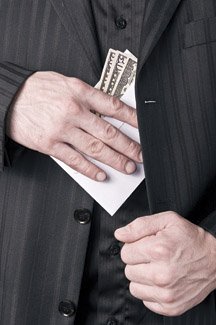One of two trials involving suspended Secaucus Tax Collector Alan Bartolozzi is set to begin next month, and attorneys are currently holding a series of status hearings in preparation for a second trial next year.
Bartolozzi is alleged to have stolen $777,725 from the Secaucus Tax Collector’s Office by skimming money from quarterly tax payments that were made in cash. Although most residents paid their taxes by check during Bartolozzi’s tenure as Tax Collector, town auditors believe enough payments were made in cash that it was easy for the alleged thefts to go undetected for years.
“We just don’t accept the cash anymore, because we learned the hard way.” – Michael Gonnelli
________
State: It’s okay with us
After decades of accepting cash for tax payments, the Secaucus Town Council in February passed a law barring the practice on the recommendation of an independent auditor.
That same month, the former deputy tax collector in Bergenfield, Marlon Mikesell, was sentenced to eight years behind bars for taking more than $196,000 in cash payments in that town. According to the Bergen County Prosecutor, Mikesell pocketed cash payments made by taxpayers, gave them handwritten receipts, and never recorded those payments in the town’s computer system. Mikesell, who pleaded guilty to two counts of theft, ran this scheme from August 2006 to March 2007, according to published reports.
Despite the Mikesell case, however, Bergenfield has not followed Secaucus’ lead and still allows residents to square their tax bills in cash – and the borough isn’t alone in this regard.
According to the New Jersey Department of Community Affairs (DCA), there are no state laws against cash payments of property taxes and other municipal fees and fines, and cash payments are “common,” according to a DCA spokeswoman.
“There is no law prohibiting the payment of fines and taxes in cash,” said DCA spokeswoman Lisa Ryan. “All government agencies that handle funds have internal control practices for the handling of cash, which includes issuing receipts, regular balancing of accounts, and required deposits within 48 hours of all receipts. Some practices go beyond routine commercial practices conducted in the business environment.”
Despite the risks involved with cash payments, towns continue to accept greenbacks because they want to make it as easy as possible for residents to pay property taxes – the life blood of every New Jersey municipality.
“There are people who do not have checking accounts or credit cards that have financial transactions with government agencies,” Ryan said, making a point later echoed by Secaucus Town Administrator David Drumeler.
“When I was [working] with the county, the Hudson County Clerk made all their fees be paid by check or money order,” he recalled. “The people who had the biggest problem were folks who were less likely to have checking accounts. It became such a hardship that the clerk reversed course on that.”
A number of public entities, he said, actually have laws on the books that specifically require the acceptance of cash payments, even in hefty amounts. The state apparently has no problem with such laws. When asked whether New Jersey plans to issue any guidelines regarding cash payments Ryan said, “Not at this time.”
Secaucus is the only Hudson County municipality that won’t take cash for tax payments.
Despite money orders and online and electronic payment options, cash still remains popular with many taxpayers.
“It’s tough to break people from that habit, especially senior citizens,” said Secaucus Mayor Michael Gonnelli. “Honestly, I’m sure a lot of seniors still come [into the Secaucus Tax Collector’s Office] and try to pay in cash. We just don’t accept the cash anymore, because we learned the hard way.”
In both Secaucus and Bergenfield the missing funds were reimbursed by insurance companies.
Secaucus ‘less worried’ about smaller payments
The ordinance passed by the Secaucus Town Council in February specifically pertains to the payment of property taxes only and does not address other types of payments for which the town still accepts cash, most notably recreation fees.
“We’re less worried about [the theft of] these fees because both the volume of money that comes in and the individual amount of the payments are much smaller,” said Drumeler.
(Traffic tickets and fines paid in Municipal Court, Drumeler added, are under the jurisdiction of the Administrative Office of the Courts and are not under the authority of the town.)
One notable exception is the thousands of dollars in unpaid false alarm fines the town is currently trying to collect from several Secaucus-based businesses.
Earlier this year, the new Gonnelli administration discovered the town was owed $750,000 in uncollected false alarm fines dating back several years. Since April the administration has been trying to get these outstanding fines paid.
“Those fines are not small. In many cases they’re tens of thousands of dollars,” the mayor stated. “But we won’t take that in cash. Nor would they pay in cash. When it comes to those fines, we’re talking about big companies, big corporations. It’s not like Mrs. Jones coming in to pay her taxes.”
Gonnelli and Drumeler both said the town has controls in place to handle the collection of parking meter income, another big money maker for most municipalities, including Secaucus. According to them, the coins collected go from a locked bin directly into a locked cart, and only a bank manager has accesses to the keys needed to open the cart.
Parking meter thefts have long been a problem for municipalities throughout the nation.
E-mail E. Assata Wright at awright@hudsonreporter.com.
